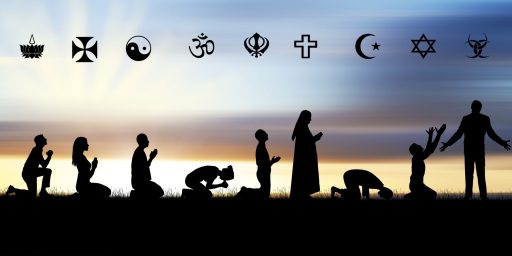Truth and Its Consequences
Donald Sensing is marketing a book, tentatively entitled Truth and Its Consequences, he’s writing on the war with terrorism. From the Introduction:
This war is in fact a religious war all around, even though we of the West generally shun the idea. Unquestionably, though, our Islamist enemies know it, as do hundreds of millions of other Muslims who have not taken up arms against us. Even Muslim voices who counsel peace to their brethren understand what the real religion of Western people is, often more than we.
In the last several hundred years the West evolved a distinctive answer of what is truth and what is its authority. In contrast, Islam’s progress in that inquiry mostly stopped just as the West was shifting out of first gear. Until the last half-century, the divergence between the West’s and Islam’s theology and philosophy of truth was not a basis for contention. After World War II the divergence took on a character that unfortunately was much more adversarial than cooperative, and finally more violent than peaceful.
This history, later coupled with cheap technology, worldwide communications and increasing globalization of economies and politics, butted headlong into Islamic societies that were ruthlessly patriarchal, theocratic, tribal and anti-democratic, all antithetical to what the West had become. After a four-hundred year hiatus, armed conflict between the West and a powerful strain of Islam broke out again.
This book is an historical, philosophical and religious exploration of how America and the West came into potentially catastrophic conflict with a prominent strain of Islam. For that topic, everyone, regardless of religion, creed or nationality is intensely interested in questions about truth and its authority. Like Pilate, both we and our present enemies realize that some answers are very threatening and that not all answers can be reconciled with one another. Unless we improve our understanding of the deep roots of the conflict and what is really at stake, we can’t effectively discern what to do next.
Sensing, a retired field artillery officer and current Methodist minister, has a unique perspective on the issue. It should be an informative read.






I am not sure how Sensing’s regurgitation of Huntington’s discredited thesis contributes any insight into the issue of terrorism. Broad distinctions, as Sensing seems to accept, between “the West” and “Islam” ignore both the diversity within those arbitrary categories and the actual consequences of global power that have marked international relations over the past one-hundred and fifty years or so.
I would point readers to Jonathan Raban’s critical essay on the issue of terrorism in the latest New York Review of Books for a realist interpretation that calls into question the assumptions that seem to guide an ideologue like Sensing.
http://www.nybooks.com/articles/17676
Ten per cent want to murder us, and ninety per cent cheer them on. Some diversity!